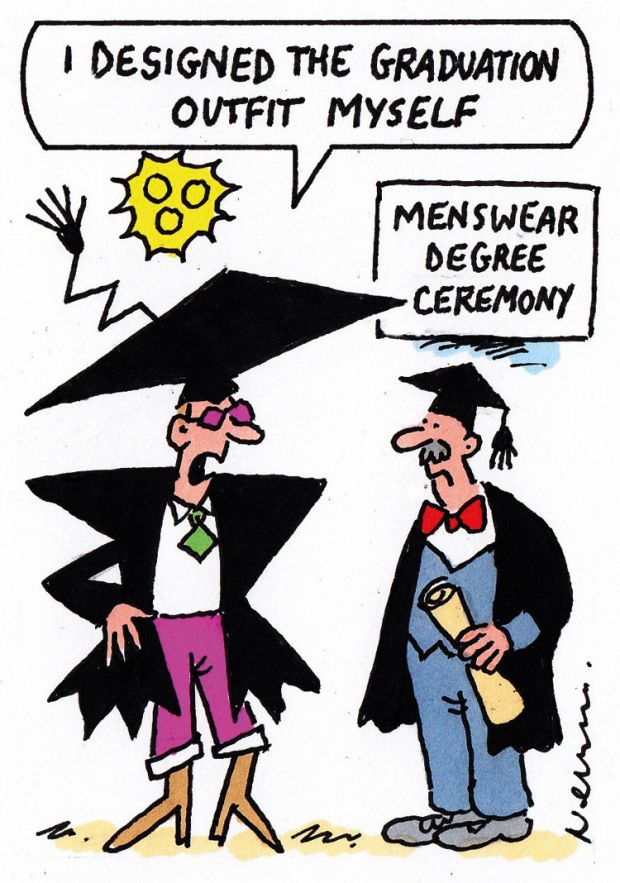
The world’s first two-year master’s in menswear is to start at the University of Westminster this autumn, the Business of Fashion website revealed on 12 January. The new course signals a revived interest in men’s style, which has even seen Hollywood actor Antonio Banderas sign up for a men’s fashion course at Central Saint Martins, part of the University of the Arts London, where the Zorro star is hoping to bring capes back into vogue. “Menswear was still in the shadow of womenswear [but] now it is accepted as its own fashion discipline, which is really exciting,” said the Westminster course leader Ike Rust, former head of menswear design at the Royal College of Art. It seems a safe bet that very few of the course’s first intake will show up for class in a hoodie and tracksuit bottoms, still the standard option for many undergrads at other universities.
Remember the protests when the Education Maintenance Allowance was scrapped five years ago? Some ministers and civil servants probably still do, which may explain why the official decision to scrap student maintenance grants – worth about £1.5 billion a year to 500,000 low-income undergraduates – was taken in a backroom at Westminster by a committee of just 18 MPs, The Independent reported on 14 January. One of them, Wes Streeting, ex-National Union of Students president and now Labour MP for Ilford North, blasted the obscure location for such a massive policy shift, which he believed merited a Commons debate and vote. “How can any member look themselves in the mirror this evening and say this issue has been properly considered?” asked Mr Streeting. MPs were finally set to have a say in the Commons chamber after opposition parties came together to force a debate on the matter on 19 January, but it may be a little after the horse has bolted.
A medical society has been banned from the University of Liverpool for risqué jokes contained in a student revue despite the fact that they were never performed, The Observer reported on 17 January. The Liverpool Medical Students' Society, which has existed for more than 170 years, was deratified by Liverpool and its student union after it was investigated over the leak of a draft script submitted for its Smoker sketch show, which apparently mocked anti-rape campaigners, the paper said. The play, James Bondage in Hymens Aren’t Forever, featured a character wielding a dildo and another named Dr No Means No – although it was vetoed by the society’s committee and never performed. Liverpool said that it had withdrawn recognition as the society had failed to fully address concerns after an investigation into its activities, which included reports that it had held a men-only dinner. But Andrew Fitzsimons, president of the 1,700-strong society, said that the “completely disproportionate sanctions” were wrong and called for the university to reverse its decision.
Are universities to blame for young people’s lack of patriotism? According to the latest data from the British Social Attitudes survey, just 20 per cent of 18- to 19-year-olds in 2013 said that they felt “very proud” of their nationality, down from 32 per cent 10 years earlier, The Sunday Telegraph reported on 17 January. That compares with 66 per cent of those aged 75 or older who felt pride in Britain, the paper says. Higher levels of university attendance may explain why so few young people were proud to live in this sceptred isle, said polling guru John Curtice, professor of politics at the University of Strathclyde. “Universities themselves are quite international – they constantly have that international perspective in many respects and also just encourage people to be a little bit critical about the world,” said Professor Curtice. Maybe the welter of student-organised parties to mark the Queen’s 90th birthday in May will prove him wrong? Or perhaps not.
Most new vice-chancellors wait a couple of months, sometimes years, before putting their head above the parapet on controversial political topics. Not Louise Richardson, who took the reins at the University of Oxford earlier this month. In an interview with The Daily Telegraph on 16 January, Richardson said that she was comfortable with institutions giving platforms to extreme speakers, including Cage, the lobbying group under scrutiny by some newspapers over its campus activity. “Provided that they can be countered, I think that we should let them be heard,” said Professor Richardson, an expert on terrorism. “The default is that we should be very permissive, unless someone is inciting violence, unless someone is breaking the law,” she added.



